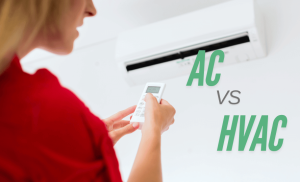When it comes to heating, ventilation, and air conditioning (HVAC), the system you choose can make all the difference in comfort, efficiency, and energy savings for your home or business. HVAC systems come in various types, each designed to meet different needs, preferences, and spaces. Understanding the different options available can help you make an informed decision and find the perfect system for your property.

Here’s a look at the most common types of HVAC systems:
1. Split HVAC System
The split system is the most common HVAC system used in homes today. It consists of two main parts: an indoor unit (air handler) and an outdoor unit (condenser). The indoor unit is responsible for distributing cool or warm air inside, while the outdoor unit handles the heat exchange, cooling or heating the air. This system is often paired with ductwork to distribute the air throughout the building.
Why Choose It?
- Offers both heating and cooling in one system.
- Can be very energy-efficient.
- Ideal for homes with existing ductwork.
2. Ductless Mini-Split System
For homes or spaces without existing ductwork, a ductless mini-split system is a great option. Like the split system, it has an indoor and an outdoor unit. However, it doesn’t require ductwork to deliver heated or cooled air. Instead, small air handlers are mounted directly on the wall of each room or zone, and they are connected to the outdoor unit via a small conduit.
Why Choose It?
- Perfect for homes without ductwork or for room additions.
- Allows for zoning, meaning you can control the temperature in different rooms.
- More energy-efficient because it avoids energy loss associated with ducts.
3. Packaged HVAC System
A packaged system combines all of the components—compressor, evaporator, and condenser—into one unit, usually placed outside the building. These systems are most often used in commercial spaces, but they can also be suitable for homes with limited indoor space.
Why Choose It?
- All-in-one solution, which saves space.
- Easier to maintain since everything is in one location.
- Works well for buildings with limited room for an indoor unit.
4. Geothermal Heat Pumps
Geothermal systems are becoming increasingly popular for their environmental benefits and long-term cost savings. This system uses the earth’s natural temperature to heat or cool your home. A geothermal heat pump transfers heat from the ground into the building during the winter and does the reverse in the summer, maintaining a comfortable temperature year-round.
Why Choose It?
- Extremely energy-efficient and environmentally friendly.
- Low maintenance and long lifespan.
- Great for homes looking for an eco-friendly, sustainable solution.
5. Hybrid HVAC System
A hybrid system combines a traditional furnace with a heat pump. The system automatically switches between the two based on the outside temperature to ensure the most energy-efficient heating and cooling. In colder weather, the furnace takes over, while in milder temperatures, the heat pump kicks in.
Why Choose It?
- Offers the flexibility to optimize energy use.
- Saves money by adjusting heating needs according to the weather.
- Ideal for homes in areas with fluctuating temperatures.
6. Central HVAC System
A central HVAC system works by using a centralized unit to regulate both heating and cooling throughout a building. The system relies on ductwork to distribute air from a single location to all rooms. This type of system is typically used in larger homes or commercial buildings.
Why Choose It?
- Efficiently heats or cools large spaces.
- Can be combined with smart thermostats for better control.
- Great for multi-story buildings or larger areas.
7. Window HVAC Units
For smaller spaces or as a temporary solution, window units are a practical option. These systems are self-contained, compact units that can be installed in a window or a through-the-wall application. They are great for small apartments, offices, or individual rooms.
Why Choose It?
- Cost-effective for cooling individual rooms.
- Easy to install and maintain.
- A good choice for renters or those who only need occasional heating or cooling.
Conclusion
Selecting the right HVAC system depends on various factors, such as the size of your home, existing infrastructure, energy efficiency goals, and budget. Whether you opt for a traditional split system, a ductless mini-split, or an eco-friendly geothermal option, understanding the different types of systems available can help ensure that you make a choice that best suits your needs.
When in doubt, it’s always a good idea to consult with an HVAC professional who can assess your property and recommend the best solution. With the right system in place, you’ll be able to enjoy year-round comfort and energy savings.












